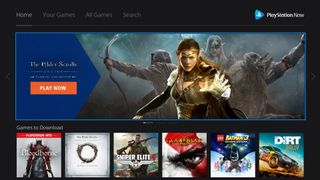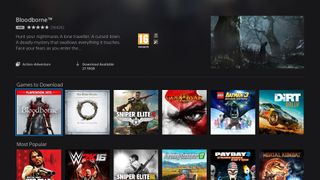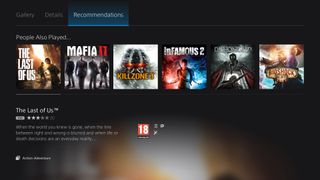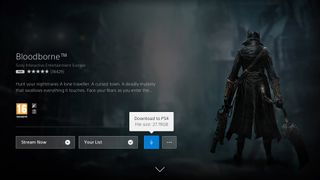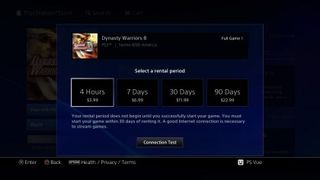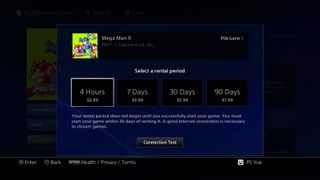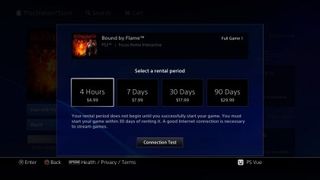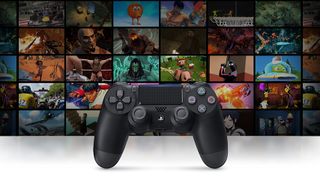PlayStation Now (or PS Now, to use its truncated name) has come a long way – from rather sketchy beginnings – to become one of the best gaming subscription services out there.
It was back in 2012 that Sony bought the then-barely-known cloud gaming service, GaiKai, to the tune of $380 million (£242 million, AU$518). The decision was met with tepid excitement and heaps of skepticism, most of it understandable.
How could the average user expect a stable, quick connection for an entire gaming session? And how could Sony price PS Now so that both consumers and developers get a fair deal?
In the years since, PlayStation now has grown in quality and range, broadband speeds have risen and risen, and no one is doubting how good an idea PlayStation Now is any more – especially with Microsoft’s xCloud service looking to beef up the competition.
With a new download feature allowing users to play PS4 and PS2 titles offline, the service is also increasingly butting heads with Xbox Game Pass, which purely offers game download ‘rentals’ rather than trying to live-stream games over the cloud – meaning you can play through (at least some) PS Now games without fighting over bandwidth with your housemates.
What is PlayStation Now?
PlayStation Now is a digital game-streaming service from Sony. In simplest terms: you pay Sony a monthly subscription fee and they’ll let you access a Netflix-style library of over 500 titles, to pick-and-choose what you play over the internet rather than run each title off a dedicated disc.
You used to be able to ‘rent’ games individually for one-off payments, but it’s now the subscription or nothing.
For a long time, PlayStation Now was exclusive to the PS4, but it’s since been extended to work on Windows PCs as well.
As far as which games you can play, we’d say the selection of games is getting better all the time. Most are from the PS3 era, but PS2 games are now included – even if PS Vita games no longer are.
PS Now design and interface
Once you pick a game, the service will connect you to a remote server that will host your session. A few moments later and the game is up and running.
From there it’s up to you to navigate the respective title’s own menu, settings, controls, and the like. The service doesn’t magically remaster old titles, though, so especially for older games like Ico or Rogue Galaxy, the visual quality will largely depend on how well your television upscales low-resolution content.
If you set up a streaming session, this means there’s no need to download the game – though you can now do just that for the PS4 and PS2 libraries on the service. If you’d rather temporarily save a game to your hard drive and plough through it offline than rely on the strength of your broadband connection, the option is there.
PlayStation Now’s interface is incredibly simplistic, maybe overly so. All you’ll see, after you get past the paywall are the games – the titles are separated into categories with featured titles, usually grouped by genre, at the top.
Scrolling down, you’ll find more discrete categories, like 2D fighting games or JRPGs, for example. There are about a dozen categories to pick from, with some titles appearing in multiple categories.
After you pick a game from the list and play it for the first time, the game will appear on the home screen so that you can easily pick it up again in the future.
There was a time that we hoped, perhaps somewhat naively, that PlayStation Now would be the Netflix of video game streaming. The hope was that we could shell out our cash and access any game on the service forever – so long as we didn’t let our subscription lapse.
PlayStation Now hasn’t quite unfolded that way. That’s not to say that the service is bad, mind you. It’s just… different.
All a streaming video service has to do is push content from a server to your console. It needs to know when you pause, obviously, but other than a few small commands, the service doesn’t really take any input.
That need to always be listening for commands and interpreting them in real time is what makes a service like PlayStation Now a nightmare to code. For you, this point can mean the difference between lag-free gameplay and an unplayable experience.
PS Now game library
Latest PS Now Games:
God of War
GTA 5
Prey
Metro 2033 Redux
Bloodborne
Project Cars 2 (US only)
God Eater 2 (US only)
Dirt 4 (Europe only)
At last count, PlayStation Now has more than 800 games available to stream, and many of them – PS4 and PS2 titles – available to download.
They range in value and prestige from some of the must-play games of the last generation, like Red Dead Redemption or The Last of Us, to small indie darlings, to some completely forgettable, bargain bin fodder.
But the decent titles are worth the price of entry. Games like Saints Row 3, Enslaved: Odyssey to the West, Darksiders and Catherine are all up for grabs, while Sony provides a few platform exclusives, like Ico, Shadow of the Colossus and Ratchet and Clank, that are excellent as well. Not to mention the Batman Arkham trilogy, Until Dawn, Borderlands, Bioshock: Infinite, and Ultra Street Fighter IV.
In addition, PlayStation Now offers PC players the chance to play Bloodborne for the first time – as the title has always been a PlayStation exclusive.
Sadly, not every game is worthwhile: some of the hundreds of games are clearance pile fodder, and have been for the past few years.
I don’t know anyone lining up to play Heavy Fire: Shattered Spear or Jimmie Johnson’s Anything with Wheels, and while I’m sure someone out there really enjoys Wheel of Fortune and Frogger HD, it’s not me. But the variety offered here should be enough to please a diverse set of tastes.
That offering has certainly improved over time: just like Sony’s PlayStation Plus subscription, which offers a handful of free games for download each month, PS Now treads the line between desirable games and those that are just about going out of fashion.
Unlike Xbox Games Pass, it doesn’t offer the latest AAA games, but it does offer a convenient way to access a library of old titles that are either hard to get hold of, or just a way to test titles without a market-price barrier.
PS Now pricing
PlayStation Now could offer the biggest and best games from the company’s 20-year foray into game consoles, but if the pricing is wrong, none of it will matter. Knowing full well that prices and dollar signs are what sinks ships, pricing is one area that Sony has given special attention to over the last year of PlayStation Now’s existence.
In October 2019, Sony slashed the pricing from $19.99/£12.99 per month to only $9.99/£8.99 per month. For US gamers, that’s a half-price difference, while UK players will still be saving a neat £48 over the course of the year.
You also have the option to pay quarterly at $24.99/£22.99, down from $44.99, or annually for $59.99/£49.99 down from $99.99/£84.99.
What’s most notable about this, though, isn’t just the saving, but how it drags down the price to match Microsoft’s competing Xbox Games Pass service, which costs $9.99/£7.99 per month.
In the beginning, there was the option to rent games as needed from the PlayStation Now store, rather than pay a monthly subscription fee. That option has now been ditched, so it’s the subscription fee or nothing.
In the images below you can see how it used to work. A table of three games: one PS3 game, one PSN game, and one more recent PS4 game that display not only the difference in price over each time period, but the difference between games from different platforms as well.
Where we can see PlayStation Now finding some traction is with gamers supplementing their PS4 experience with what essentially amount to rentals – or, crazier, users giving up their physical media collection completely.
This depends largely on how quickly publishers get on board with game-streaming as a way to play. But, in a perfect world in which games launch simultaneously on retail and PS Now, you could be playing the week’s biggest games without leaving your couch for your subscription fee.
It’s a shame we haven’t seen a joint membership option for both PS Plus and PS Now, given the accumulated monthly fees are likely to prevent high uptake. If the choice is between a cost-effective way to play online on the one hand – and receive a couple of free old games each month, too – and a streaming service with numerous connection issues that’s twice the price on the other, which one would you choose?
PS Now stream quality
Another area that could use some sprucing up is the streaming quality, although it’s slowly improving. Not only do games take 30 to 45 seconds to load up, but any hiccup in the connection completely derails gameplay.
While Sony is only recommending connection speeds of 5Mbps, it’s not until 10 to 15Mbps that you’ll truly reach the promised land of uninterrupted gameplay. And for more demanding AAA games like Bloodborne or Batman: Arkham City, you’ll be wanting all the connection speed you can to get the most out of your play session.
If you leave this review with one piece advice, have it be this: use an Ethernet cable instead of the system’s Wi-Fi. A lost connection to your router will boot you from the game whether you’ve saved 10 seconds ago or 10 minutes ago. (We got booted from games multiple times due to a bad connection.)
When we first tested the service, we found pretty much everything except low-intensity platforming games like Braid would cause at least infrequent jitters. The busier the screen, the harder it will be, but the work Sony has put into the service over the last year meant any issues streaming Bloodborne – 27.19GB to download, for context – were really quite negligible.
This is an area Sony can still improve on, by continuing to optimize servers and open more server farms closer to major metropolitan areas. But no matter how good you think your internet speed is, we still recommend you take advantage of the seven-day free trial before committing yourself long term to the streaming platform.
We liked
As promised, Sony delivers a slew of games. Picking which one of the 800-plus games to download first is a difficult decision, and the library continues to grow. it effectively functions as an emulator for old games too, nicely circumventing the console’s lack of backwards compatibility.
But don’t treat this like the end-all, be-all choice – because streaming doesn’t take up any space on your hard drive and there’s zero download time, you can jump from one game to the next to your heart’s content.
Ideally, that means taking advantage of the reasonably priced subscription program, even if it’s only for the seven-day trial period. It’s not that I’m opposed to shelling out for content a la carte, but you need to use caution and good judgement before you rent games that you could’ve bought outright for less.
We disliked
It would’ve been great to escape the slog of buying games and returning them for half their value, but that doesn’t seem possible with PlayStation Now in its current state. Publishers haven’t taken to the idea of putting their latest wares on the service, instead opting to put up classics of varying quality.
The other major problem is that, depending on the strength of your connection, every once in awhile, lag can derail your perfect stream in a first-person shooter or send you careening into a wall in a driving game. Worst of all, if you get booted from your game, you can say goodbye to all the progress you made since your last save.
Our verdict
As a platform, PlayStation Now has vastly improved since launch. There were just 80 games on it in the beginning, after all, and nothing like the download option players will find for PS4 and PS2 games now. The complete switch to a subscription option makes joining a simpler decision too.
As PlayStation Now continues to evolve and develop, and a growing number of publishers continue to place bets on the future of game streaming, there’s a lot to be excited about for the future.
Whether you should subscribe to PlayStation Now comes down to two questions: do you mind games that are a few years old and, more importantly, can you put up with small periods of imprecise controls in exchange for a massive, 800-plus game library?
If your answer is no to either of those, then you might want to press pause on your subscription until more third-party game makers get on-board or Sony at least fronts more recent first-party games on the subscription side of the service. If PS Now doesn’t have the games you want to play, why would you bother?
PlayStation Now still doesn’t have the pulling power or steady drip-feed of must-play games to make it as attractive a proposition as the Netflix service it has eyes on emulating.
But it’s clear that there’s a future in PlayStation Now not just for Sony, but for how we purchase games on the whole. Given the expanded library of titles and new download options for PS4 and PS2 titles, we can recommend it for those confident in their internet speeds – at least for as long as it takes to work through the titles you actually want on the service.


